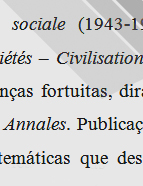

................................
15 January 1929 saw the publication of the Annales d’histoire économique et sociale (1929-1938) under Armand Colin, directed by Lucien Febvre (1878-1956) and Marc Bloch (1886-1944), both of whom were professors at the newly liberated University of Strasbourg. This title, however, would undergo variations during the years of its publication: Annales d'histoire sociale (1939-1941), Mélanges d'histoire sociale (1943-1944), Annales d'histoire sociale (1945), Annales. Economies - Sociétés - Civilisations (1946-1993), Annales. Histoire, Science Sociale as of 1994. Fortuitous changes, Lucien Febvre would say, of a journal that would always be known as the Annales. This publication became a reference for the methodological and thematic innovations that historians have since brought to history, architecture and historical discourse. It represents the birth of what would later be referred to as New History, perhaps an inaccurate designation, but nonetheless important as it marked the definitive abandonment of out-of-date positivism and eventualism.
What they sought - and this may be read in the presentation of the journal itself by its directors - was to put an end to the division between past and present and between the various studies of periods enshrined by historiographical practices. Moreover, knowledge of the past required (and demanded) the study of the present, just as knowledge of the present required (and imposed) the study of the past. The journal followed and intensified the path paved by Henri Berr, by the movement that took shape in the Revue de Synthèse (from 1900 onwards), by the work of Belgian historian Henri Pirenne (1862-1935), as well as that of companions such as Henri Hauser, Georges Lefebvre, François Simiand and Maurice Halbwachs- and of others, not necessarily historians, but also psychologists, sociologists, anthropologists, economists, geographers, and in general scholars from all the disciplines of the Social Sciences.
In addition to the articles received or requested, the Annales conducted a detailed and attentive critical review of the books that were being published, and not only history books. This was indispensable to support the principle deemed crucial to the publication of widening the scope to the social sciences. In this section of the journal, above any other, its directors, editors and reviewers defended what they considered necessary to research or write for the sake of history.
